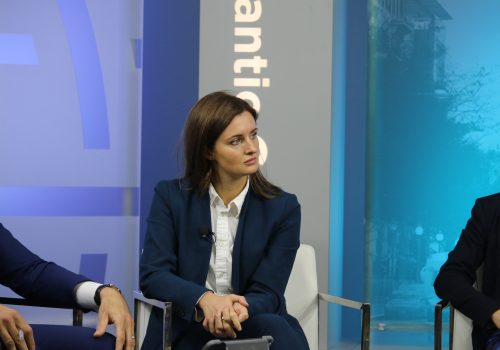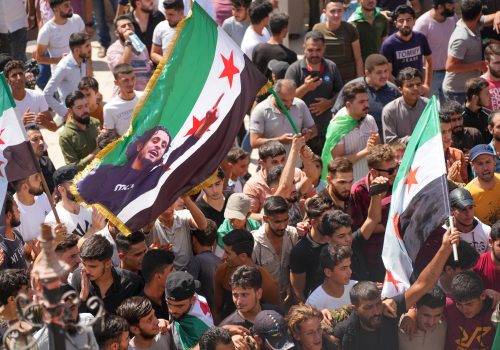The Syrian parliamentary elections are coming up. Should anyone care?
This summer, elections for the Syrian People’s Assembly will be held in the areas controlled by the government under Bashar al-Assad. As the electoral process unfolds, a series of articles will deconstruct the key elements of Syrian elections and their role in legitimizing Baath Party rule. It will also conduct a deep dive into the challenges of moving ahead with electoral reform in the United Nations (UN)-facilitated political process.
The political environment in Syria has remained unchanged since the 2020 elections. Thus, the polls will be held again against a backdrop of massive displacement, unresolved conflict, partial occupation, and an intransigent regime. At the same time, the Independent High Electoral Commission of the Autonomous Administration of North and East Syria (AANES) announced elections for municipal councils on May 30. Whether these will be followed by elections for the AANES legislature is unclear.
In northwest Syria, the General Shura Council announced the formation of a Supreme Electoral Committee to organize elections. Of course, none of these elections are “free and fair”; they are about the consolidation of power, not political competition. But their results will determine the governance setup for years to come. Little is known about what the electoral process in the northeast, and particularly in northwest Syria, will look like. However, there are fairly good insights into the process managed by the Syrian government.
SIGN UP FOR THIS WEEK IN THE MIDEAST NEWSLETTER
Historically, Syrian elections are rigged, and this election is no different. Some aspects of it are simple and in plain sight, especially the suppression of any genuine opposition, the lack of media freedoms or a safe space for civil society, and the enormous numbers of displaced voters. Other aspects are perhaps less obvious and could be overlooked when advocating or negotiating for political reforms. They appear somewhat mundane, such as the distribution of seats to electoral districts, the system of representation, and the ballot structure. Yet, they have a tremendous impact and have guaranteed an overwhelming Baath majority in parliament since 1973.
Separately, constitutional term limits for the presidency mean that the primary job of the next parliament will be to amend the constitution so that President Assad can run again in 2028. This is not unprecedented. In 2000, the parliament amended the constitution and lowered the age of candidacy from forty to thirty-four so that it could propose young Bashar for the presidency. When the UN-facilitated Syrian Constitutional Committee was set up in 2019 to discuss reforms as the prerequisite for ending the country’s civil war, some had hoped that the inevitable constitutional tweaks could present an opportunity for more substantial and negotiated constitutional reforms. But the committee has been inactive for two years, and any resurrection will need to wait for the rearranging of global political relations.
The 2015 United Nations Security Council (UNSC) Resolution 2254 sees elections in the wider context of a negotiated political resolution of the conflict. However, these will be the sixth elections organized by the Syrian regime since the adoption of UNSC Resolution 2254 and the regime will again ignore the parameters it sets, which include free, fair, and transparent elections under UN supervision, inclusion of diaspora voters, and the meaningful participation of women.
The deadline for calling elections is May 11. Russian government statements are already legitimizing the process, and the Baath Party is currently holding internal elections that may not be directly linked to the parliamentary elections. In any case, the first step in the process is to update and audit the voter register, which should be completed by next week but has not yet started.
| PHASE | TIMEFRAME | MORE INFORMATION |
| Assembly term | Starts August 10, 2020 Ends August 9, 2024 | The term begins with the first meeting of the newly elected parliament, which was held on August 10, 2020. (Constitution, Article 56) |
| Update and audit of the voter register | Earliest April 11, 2024 Latest June 9, 2024 | The voter register is updated annually at the beginning of each year and reviewed at least two months prior to any electoral event. (Elections Law, Article 29) |
| Call to elections | Latest May 11, 2024 | A presidential decree is to be issued no later than ninety days before the end of the term. In 2020, elections were called ninety-four days before the end of the term. (Elections Law, Article 23) |
| Nomination of candidates | Earliest May 12–18, 2024 | Candidacies are accepted within seven days after the publication of the decree calling for elections. (Elections Law, Article 44) |
| Nomination appeals | Earliest May 19–24, 2024 | Rejected candidates have three days to appeal if their nomination is rejected; appeals have to be resolved within three days. (Elections Law, Article 46) |
| Candidacy challenges | Earliest May 25–30, 2024 | Citizens can challenge the eligibility of candidates for three days; challenges have to be resolved within three days after submitted. (Elections Law, Article. 47) |
| Campaigning | Earliest May 31, 2024 | Candidates are allowed to campaign only after their nomination is accepted. (Elections Law, Article 49) |
| Polling centers | Earliest June 4, 2024 Latest August 2, 2024 | Polling centers open seven days prior to Election Day. The law does not imply that the list of polling centers will be published. (Elections Law, Article 12) |
| Withdrawal of candidates | Earliest June 4, 2024 Latest August 2, 2024 | Candidate can withdraw seven days prior to Election Day. (Elections Law, Article 44) |
| Electoral silence | Earliest June 10, 2024 Latest August 8, 2024 | Electoral silence must begin twenty-four hours prior to election. (Elections Law, Article 58) |
| Election Day | Earliest June 11, 2024 Latest August 9, 2024 | Elections are supposed to happen within sixty days before the end of the parliamentary mandate. (Constitution, Article 62) |
| Results | Pending announcement by the Supreme Judicial Electoral Committee | There is no timeframe for results, which are announced by the Supreme Judicial Electoral Committee. (Elections Law, Article 80) |
| Appeals of results | Pending announcement of results | Losing candidates can appeal within three days from the publication of results. Appeals have to be resolved within seven days. (Elections Law, Article 83) |
| Announcement of winners | No timeframe; announced by a presidential decree | (Elections Law, Article 81) |
Unavoidably, Syria watchers will ask why these elections should matter at all. Yet, opportunities to observe Syrian political processes are limited, so looking at the 2024 Syrian parliamentary elections is an attempt to find any evidence that Assad has any policy for the future of Syria other than reinforcing a status quo of statistically implausible polls with no opposition. Considering that the reform of the constitution is inevitable, will the composition of the parliament matter?
Vladimir Pran advises electoral authorities, governments, and political leaders on transitional, electoral, and political processes.
Maroun Sfeir advises international and local civil society organizations, political groups, and electoral authorities on electoral and political processes.
Further reading
Mon, Oct 16, 2023
Is Captagon going to halt the Arab normalization deal with Syria? An expert weighs-in
MENASource By Holly Dagres
New Lines Institute’s Caroline Rose was interviewed by our MENASource editor about the captagon crisis plaguing the region and what can be done to curb the illicit trade of the popular drug.
Tue, Sep 5, 2023
The uprising in Sweida will continue until the regime changes in Syria
MENASource By
These demonstrations call for a change in the Syrian regime and the full implementation of UNSC Resolution 2254.
Fri, Jun 9, 2023
Assad is appointing new military officials to escape sanctions on Syria
MENASource By
Of the thirty Syrian army and security officers in new leadership positions, only two are blacklisted. This indicates a significant gap.
Image: Cars drive near a poster depicting Syrian President Bashar al-Assad in Damascus, Syria May 16, 2023. REUTERS/Firas Makdesi


